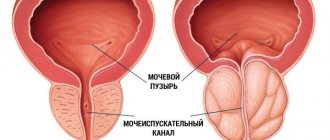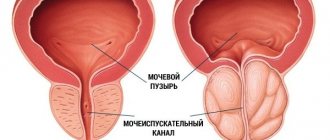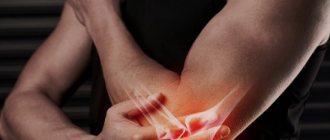Inflammation of the prostate gland is a common disease diagnosed in men over the age of 30. If the treatment of the pathology is incorrect or untimely, it develops into a chronic form that cannot be completely cured. Timely prevention of prostatitis, the rules of which are simple and accessible to everyone, will help prevent the development of the disease and its chronicity.
Risk factors for developing prostatitis
In most cases, prostatitis is bacterial in nature and occurs as a result of a decrease in the body's protective functions. Risk factors for developing inflammation of the prostate gland are:
- infectious diseases of the urinary system and their untimely treatment;
- exacerbation of chronic diseases occurring in the body;
- long-term sexual abstinence;
- promiscuous sex life, ignoring protective contraceptives;
- abuse of bad habits;
- inactive lifestyle;
- unbalanced diet, poor in vitamins, useful elements and substances;
- hypothermia;
- stress, overwork, lack of sleep.
Doctors have proven that obese men are more prone to developing prostatitis. Typically, such people lead a sedentary lifestyle, abuse bad habits, and eat improperly, which leads to a decrease in protective functions, the development of congestive processes in the pelvic organs, and the addition of a bacterial infection, which contributes to the progression of inflammatory complications in the prostate tissues. Therefore, in addition to generally accepted preventive procedures, it is important to normalize weight, improve nutrition, try to get enough sleep and get proper rest.
Diagnosis of prostatitis
The key to successful and timely treatment of prostatitis is an accurate and comprehensive diagnosis.
The low proportion of infectious prostatitis is explained in most cases by the fact that the pathogen was not detected. Chronic sexually transmitted infections can be asymptomatic, while their pathogens can penetrate the prostate tissue and cause inflammation. Therefore, laboratory research methods play a leading role in the diagnostic process. To determine the sensitivity of bacteria to antibiotics, biological fluids are inoculated: urine, semen, prostate secretions. This method allows you to select a drug that is most effective for a specific pathogen strain, capable of penetrating directly to the site of inflammation [5].
The “classical” method of laboratory diagnosis of prostatitis is considered cultural (culture of urine, ejaculate, contents of urogenital smears). The method is very accurate, but takes time. To detect bacteria, a smear is Gram stained, but in this way it is unlikely to detect viruses, mycoplasma and ureaplasma [5]. To increase the accuracy of research, mass spectrometry and PCR (polymerase chain reaction) are used [4]. Mass spectrometry is the ion analysis of the structure of a substance and the determination of each of its components. The polymerase chain reaction allows you to detect fragments of DNA or RNA of the causative agent of an infectious disease, including viruses and plasma.
Currently, for a special examination of urological patients, the Androflor analysis is used - a comprehensive PCR study of the microflora of the genitourinary tract. The result of the study is ready in a day and reflects the complete picture of the microbial ratio in the body of the subject.
Tests for prostatitis include collection of urine and ejaculate and urological smears. The European Urological Association recommends the following set of laboratory tests:
- general urine analysis;
- bacterial culture of urine, semen and ejaculate;
- PCR diagnostics.
A general urine test allows you to determine signs of inflammation (the number of colony-forming units of microorganisms, the number of leukocytes, red blood cells, urine clarity) and the presence of calcifications (prostate stones).
General analysis is included in the methodology of several urological (glass or portion) samples. Glass or portion samples consist of sequential collection of urine or other biological fluids into different containers. In this way, the localization of the infectious process is determined. Prostatitis is indicated by the detection of infectious agents, blood cells (leukocytes and erythrocytes) in the final portion of urine during a three-glass sample or after urological massage of the prostate
Two-glass test - inoculation of the middle part of the urine stream before and after urological prostate massage.
Three-glass sample - the initial, middle and final portions of urine are taken during the same urination.
Four-glass test - culture and general analysis of the initial and middle parts of the urine stream, prostate secretion after urological prostate massage and a portion of urine after this procedure.
Cultural culture or PCR diagnostics of ejaculate [4, 5] and urogenital smear material are also performed.
To make a diagnosis of prostatitis, blood tests are also required. A general capillary blood test allows you to confirm or refute the presence of inflammation, as well as exclude other diagnoses that cause the same symptoms.
Diagnosis of non-inflammatory chronic pelvic pain syndrome is more difficult, as it is based on the clinical picture and indirect laboratory indicators (including general analysis of urine and blood). The intensity of the pain syndrome is determined using a visual analog pain scale, and the severity of psychological changes is determined using scales for assessing anxiety and depression. At the same time, research is required to search for an infectious agent, since the range of pathogens can be very wide. Instrumental studies include urofluometry with determination of residual urine volume and transrectal ultrasound examination (TRUS) of the prostate gland [1, 5].
Asymptomatic prostatitis is detected by histological examination of a prostate biopsy specimen, prescribed for suspected cancer. A blood test for Prostate Specific Antigen (PSA) is performed first. PSA in the blood serum appears with hypertrophy and inflammation of the prostate, and the normal criteria change with age. This study also helps to exclude suspicions of a malignant prostate tumor [1, 2, 3].
The role of physical activity in the prevention of prostatitis
An inactive lifestyle is one of the most common causes of inflammation of the prostate gland. In people who move little during the day and are predominantly in a sitting position, venous stagnation occurs in the pelvis, as a result of which blood circulation, oxygen supply and nutrition of prostate tissue are disrupted. This leads to a decrease in local immunity and activation of pathogenic microflora. Therefore, the prevention and treatment of prostatitis necessarily include moderate physical activity, which strengthens muscles, maintains the organs of the genitourinary system in the correct position, and ensures high-quality contraction of the prostate and its complete emptying.
If possible, it is advisable to enroll in a gym, where classes are conducted under the supervision of an experienced trainer. But not everyone has the time and opportunity to visit the gym, so the ideal solution in this situation is regular workouts at home. To prevent stagnation and always keep muscles toned, it is recommended to perform the following exercises daily:
- squats;
- circular movements and body tilts;
- pumping the press;
- running in place.
An excellent way to prevent prostatitis is daily walks in the fresh air, cycling, swimming, and brisk walking.
Treatment
Patients diagnosed with acute prostatitis without complications are treated on an outpatient basis.
Only with severe symptoms of intoxication and suspicion of a purulent process is hospitalization carried out. Antibiotics are the drugs of choice to combat inflammation. They are also used for chronic bacterial forms. The medicine is selected individually and taken in a course of 4-6 weeks. In severe cases, antibacterial agents are administered intravenously, in all other cases - orally, in the form of capsules or tablets.
Another medicine used for prostatitis is alpha1-blockers, which are prescribed in the presence of residual urine confirmed by ultrasound. They help make urination easier and relax the muscles of the prostate and bladder. Medicines from the NSAID group help relieve pain.
Treatment of prostatitis is carried out only comprehensively and consistently. In addition to taking medications, the doctor will prescribe a course of prostate massage, and physiotherapy is used to improve blood circulation in this organ. Surgical treatment is used only when abscesses and suppuration of the seminal vesicles appear.
Thermal procedures (sauna, ice hole)
Properly carried out thermal procedures have a beneficial effect on the prostate, as they activate blood circulation in the tissues and help increase local immunity. However, if relaxing in a bathhouse or sauna is accompanied by drinking alcohol and eating junk food, and the man suffers from chronic prostatitis, the risk of relapse of the disease in this case increases significantly.
When visiting a bathhouse or sauna, it is not recommended to alternate thermal procedures and exposure to low temperatures - diving into cold water or dousing. Sudden changes in temperature cause stress, which causes vasospasm and disruption of the genitourinary system, which can serve as a trigger for the development of prostatitis.
How to prevent chronic prostatitis
After completing a course of therapeutic measures to treat prostatitis, it is very important to prevent relapse. To avoid exacerbation of the chronic form of the disease, men should:
- have regular sex life (preferably with the same partner);
- during casual sexual intercourse, use a condom;
- give up bad habits (smoking, drinking alcohol);
- lead an active life, play sports;
- avoid hypothermia.
Prostate massage
You can resort to prostate massage after a preliminary examination and as prescribed by a doctor. The fact is that the gland may contain calcifications and other neoplasms that a man is not even aware of. Stimulation of the prostate gland in this case can provoke an exacerbation of the underlying pathology.
Massage manipulations must be entrusted to an experienced massage therapist, otherwise the risk of injury to the gland increases. This procedure is an excellent prevention of chronic prostatitis and frequent relapses.
Symptoms of prostatitis
- Fever (from 38-39 degrees Celsius for acute prostatitis and low-grade fever for chronic prostatitis).
- Urinary dysfunction: frequent urge to urinate, not always effective, difficulty or increased frequency of urination, especially at night. The urine stream is depleted, and there is always some residual amount in the bladder.
- Prostate damage: leukocytes and blood in semen, pain during urological examination.
- Fibromyalgia.
- Prostatorrhea is a small discharge from the urethra.
- Pain in the pelvis, perineum, testicles, above the pubis, penis, sacrum, bladder, scrotum.
- Painful urination and ejaculation [2, 6].
- Convulsive muscle spasms.
- Stones in the prostate gland.
- Chronic fatigue, a feeling of hopelessness, catastrophe, psychological stress against the background of chronic pain syndrome.
- Decreased performance (asthenia), decreased mood, irritability).
- Sexual dysfunction – erectile dysfunction, premature ejaculation, lack of orgasm.
- Irritable bowel syndrome and proctitis may occur [3, 5, 6].
In the chronic course of the disease, the signs of prostatitis are blurred (less pronounced), but they are accompanied by general, neurological and mental symptoms [6].
Prevention of infectious prostatitis: sexual hygiene
One of the most common causes of infectious prostatitis is unprotected sex with a partner who is a carrier of pathogenic microflora. Men who practice anal sex without a condom are at risk. Microorganisms that live in the rectum, after penetration into the urethra, cause acute inflammation, which spreads to neighboring organs, including the prostate gland.
Oral sex can provoke prostatitis. The fact is that in the mouth there are potential sources of pathogenic microorganisms - tonsils, teeth affected by caries, tongue. To avoid infection, it is important to maintain sexual hygiene, and if the partner is not a permanent one, use protective contraception - condoms.
What men need to know
- The prostate is seriously damaged by physical inactivity and prolonged uncomfortable forced posture. Those who spend their working day sitting should do at least gymnastics for the pelvic floor muscles.
- It is necessary to adhere to a healthy diet high in vitamins, protein, and eat more vegetables and fruits. But it is not recommended to adhere to the now fashionable vegetarian diet.
- Consume antioxidants - alpha and beta carotenes, vitamins E and C. They neutralize free radicals in the body caused by environmental pollution.
- Avoid spicy, fried, pickled foods, especially those seasoned with hot sauces, mustard, pepper, and horseradish.
- Under no circumstances should you drink alcohol. Smokers who care about the prostate, potency and fertility should give up this bad habit.
- Sexual life should be normal, in accordance with a man’s constitution and sexual temperament. It is forbidden to abstain from sexual intercourse. Avoid platonic sexual relations, which will cause the prostate and pelvic organs to become engorged with blood.
Quitting alcohol and smoking
Nutrition
Diet and balanced nutrition play one of the most important roles in preventing the disease. To prevent the development of prostatitis, it is necessary to regularly empty the intestines and prevent constipation. The fact is that solid feces accumulated in the intestines put pressure on the prostate gland, disrupting normal blood circulation and fluid evacuation. Over time, stagnation leads to a decrease in local immunity and tissue inflammation.
To improve stool and bowel function, nutritionists advise diversifying your diet with fresh fruits, vegetables, and cereals. The menu must also include the following products:
- cottage cheese, kefir, sour cream;
- fish, seafood;
- lean meat;
- nuts, pumpkin seeds;
- dried fruits;
- vegetable soups;
- fresh salads with herbs and vegetable oil.
Patients suffering from chronic prostatitis will forever have to give up alcohol, salty, spicy, fatty, fried foods, which can cause exacerbation.
Is it difficult to treat this inflammation?
Very difficult. It requires a lot of patience and perseverance not only from the patient, but also from the doctor. Currently, more than 100 types of drugs are used, and there are several dozen methods of treatment. Almost every patient with chronic prostatitis needs to be treated individually.
Since time immemorial, the truth has been known: “Chronic prostatitis must be treated while the disease lasts.” One of the main reasons for treatment failure is stopping treatment when signs of improvement appear.
Pharmaceuticals
Medications for the prevention of prostatitis are aimed at normalizing the functioning of the gland. The main active components of such medicines are natural plant extracts, which gently eliminate the inflammatory process, normalize blood circulation, and eliminate congestion.
To prevent prostate inflammation, urologists prescribe the following pharmaceuticals:
- "Prostopin";
- "Vitaprost";
- "Longidaza";
- "Indigal";
- "Uroprost";
- "Hyperprost";
- "Fitoprostan";
- "ProstaNorm";
- "Peponen";
- "Cernilton."
An ideal remedy for the treatment and prevention of prostatitis!
For the treatment and prevention of prostatitis, urologists prescribe the drug “Prostamol Uno”, the main advantages of which are:
- anesthesia;
- normalization of urination;
- destruction of bacterial infection;
- antiandrogenic and antiexudative effects.
The drug has a positive therapeutic effect even in advanced cases. To stop the inflammatory process and pathological symptoms, one capsule per day is enough. The medicine has virtually no contraindications or side effects, so urologists readily prescribe it both for the treatment and prevention of inflammation of the prostate gland.
Prognosis and prevention
The acute form without treatment often becomes chronic, which periodically worsens.
Complete recovery is not always possible, but if you consult a doctor in a timely manner and take all prescribed medications, you can eliminate discomfort, problems with urination and pain. Self-treatment at home and the use of traditional methods can often be life-threatening.
To prevent prostatitis, it is recommended to avoid hypothermia, empty the bladder in a timely manner, limit the consumption of coffee, spices and alcohol, and remain sexually active as long as possible.
Author of the article: Evgeniy Vitalievich Zavalishin, urologist, andrologist, ultrasound specialist of the genitourinary system
Preventive examinations
It is advisable for all men to undergo a preventive urological examination once a year. This is especially true for representatives of the stronger sex over 40 years of age. The fact is that in adulthood, the number of risk factors for the development of inflammation increases markedly: hormonal levels change, various chronic pathologies accumulate, and physical activity decreases. To identify diseases at the initial stage, it is advisable to visit a urologist at least once a year, undergo a preventive ultrasound, and undergo basic tests.
When to think about prostate health
With age, the amount of testosterone in the male body naturally decreases. This affects the activity of sexual life and increases the risk of stagnation. Upon reaching the 40th birthday, doctors recommend regular preventive examinations and monitoring the condition of the gland. According to statistics, by the age of 80, almost 90% of men suffer from some kind of disorder in this organ. At the same time, doctors urge young people to monitor their health. A sedentary lifestyle, infectious lesions, and chronic diseases contribute to the earlier development of pathology.






